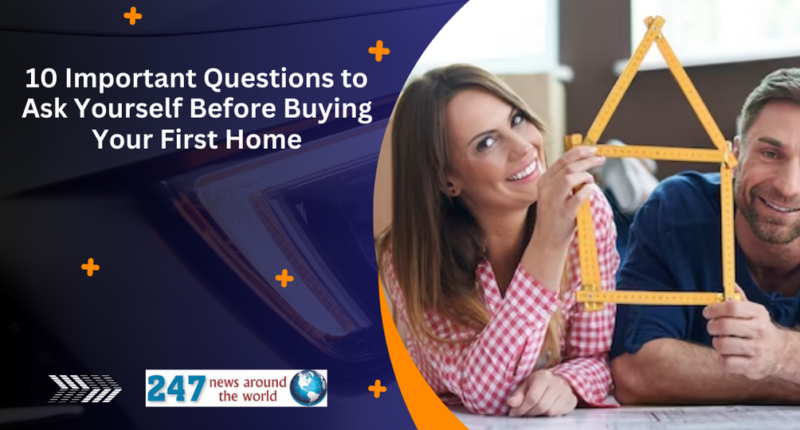A look at “10 Important Questions to Ask Yourself Before Buying Your First Home” Purchasing your first home is an exciting milestone in life. However, it is also a significant decision that requires careful consideration. Before diving into the world of real estate, it’s essential to ask yourself some crucial questions to ensure you make a well-informed and wise investment. In this article, we will explore ten important questions that every prospective homebuyer should ponder before taking the leap into homeownership.
10 Important Questions to Ask Yourself Before Buying Your First Home
Here are 10 important questions to ask yourself before buying your first home:

1. What is My Budget?
Before you start browsing through available properties, it’s crucial to determine how much you can afford. Analyze your financial situation, including your savings, income, and existing debts. This assessment will help you set a realistic budget for your first home and avoid overextending yourself financially.
2. What are My Long-Term Goals?
Consider your long-term goals and how owning a home fits into them. Are you planning to stay in the area for an extended period, or is this a temporary arrangement? Understanding your long-term plans will influence the type of property you choose and its location.
3. What are My Must-Have Features?
Make a list of features and amenities that are essential to you in a home. Whether it’s a specific number of bedrooms, a backyard, or proximity to schools and public transportation, knowing your non-negotiables will help you narrow down your search.
4. Should I Work with a Real Estate Agent?
Decide whether you want to enlist the services of a real estate agent or go solo. An experienced agent can provide valuable insights, guide you through the buying process, and negotiate on your behalf. However, keep in mind that their commission will add to your overall costs.
5. Have I Considered Additional Expenses?
Owning a home comes with various costs beyond the purchase price. These may include property taxes, homeowner’s insurance, maintenance, and utilities. Ensure you have factored in these additional expenses when setting your budget.
6. What is the Condition of the Property?
Inspect the condition of the properties you are interested in thoroughly. Consider hiring a professional home inspector to identify any potential issues. Understanding the property’s condition will help you avoid unexpected expenses down the road.
7. How is the Neighborhood?
The neighborhood you choose to live in can significantly impact your lifestyle and daily routine. Research the area’s safety, access to amenities, schools, and community atmosphere to ensure it aligns with your preferences and requirements.
8. Is Now the Right Time to Buy?
Real estate markets can fluctuate, so it’s essential to assess whether it is the right time to make a purchase. Analyze market trends, interest rates, and economic indicators to determine if it’s a buyer’s or seller’s market.
9. What are the Financing Options?
Explore different financing options, including mortgages, loans, and down payment assistance programs. Compare interest rates, terms, and conditions to find the best option that suits your financial situation.
10. Have I Negotiated Effectively?
Once you find a property you like, don’t hesitate to negotiate the price. Skilled negotiation can lead to significant savings or added benefits. Be prepared to discuss the terms and come to a mutually agreeable agreement with the seller.
Key Takeaways
Here are the key takeaways from the 10 questions:

- Budget: Before you start looking at homes, you need to know how much you can afford to spend. This includes your down payment, monthly mortgage payment, property taxes, homeowners insurance, and maintenance costs.
- Time horizon: How long do you plan on staying in the home? If you’re only planning on staying for a few years, you may want to consider renting instead. Homeownership comes with a lot of upfront costs, and you may not recoup those costs if you sell the home in a short period of time.
- Needs and wants: Make a list of the things that are important to you in a home, such as the number of bedrooms and bathrooms, the size of the yard, and the location. This will help you narrow down your search and find a home that meets your needs.
- Down payment: A down payment is typically required for a mortgage, and the amount of your down payment will affect your monthly mortgage payment. Aim to save at least 20% of the purchase price of the home, but even a smaller down payment is better than nothing.
- Credit score: Your credit score will affect the interest rate you are offered on a mortgage. A good credit score will help you get a lower interest rate, which will save you money in the long run.
- Home buying process: The home buying process can be complex, so it’s important to understand the steps involved before you start. Talk to a real estate agent or lender to learn more about the process.
- Costs of homeownership: In addition to the mortgage payment, there are other costs associated with homeownership, such as property taxes, homeowners insurance, and maintenance costs. Make sure you have a budget for these expenses before you buy a home.
- Responsibility of homeownership: Homeownership is a big responsibility, and it’s important to be prepared for the work involved. This includes things like yard work, repairs, and maintenance.
- Unexpected expenses: Things don’t always go according to plan, so it’s important to have a plan for unexpected expenses. This could include things like a major repair or a job loss.
- Excitement: Buying a home is a big decision, so it’s important to be excited about it. If you’re not excited, you may not be as motivated to take care of the home and make it your own.
Conclusion
Buying your first home is a milestone that can be both exhilarating and nerve-wracking. By asking yourself these ten important questions and carefully considering your answers, you can make a well-informed decision and embark on your homeownership journey with confidence.
FAQs
-
Can I buy a home with bad credit?
Answer: While having good credit is ideal, there are still options available for those with bad credit, such as FHA loans or seeking a co-signer.
-
Should I buy a fixer-upper?
Answer: Buying a fixer-upper can be a cost-effective option, but consider your renovation budget and skills before making a decision.
-
What is a down payment?
Answer: A down payment is an upfront payment made by the buyer, typically a percentage of the home’s purchase price, to secure the purchase.
-
How long does the home buying process take?
Answer: The home buying process can take anywhere from several weeks to a few months, depending on various factors like market conditions and loan processing.
-
Do I need a home warranty?
Answer: While not mandatory, a home warranty can provide added protection and peace of mind for potential future repairs or replacements.
You may also like | Personal Budgeting And Cash Flow Management Strategies
Last Updated on September 15, 2023 by 247 News Around The World






